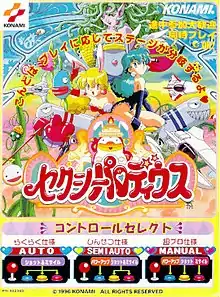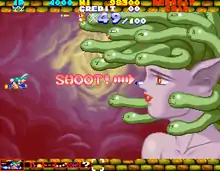Sexy Parodius
Sexy Parodius[lower-alpha 1] is a 1996 horizontal-scrolling shooter arcade game developed by Konami.[1] It is the fifth installment of the Parodius series. Like the rest of the series, it is a parody of the Gradius series and other Konami games. It also contains sexual level and enemy designs, as well as risqué innuendo. Many level bosses are women in various erotic costumes (such as the "bunny costume" modeled on Playboy Bunnies) or various states of undress.
| Sexy Parodius | |
|---|---|
 Arcade flyer | |
| Developer(s) | Konami |
| Publisher(s) | Konami |
| Composer(s) | Mayuko Kageshita |
| Series | Parodius |
| Platform(s) | Arcade, PlayStation, Sega Saturn |
| Release |
|
| Genre(s) | Horizontal-scrolling shooter |
| Mode(s) | Single player, multiplayer |
Gameplay

The gameplay in Sexy Parodius is similar to the rest of the series, but the player must complete a special mission for each stage. These missions range from collecting a certain amount of coins in a stage to destroying a certain object or enemies. Whether or not the player completes the mission determines whether the player can continue to the next stage or what the next stage will be. Unlike the past versions, home ports of the game (except the PSP version) have cooperative multiplayer intact. The game continues to play even when one player is choosing a character upon continuing.
In a 2-player game, when certain characters are near enough, a third shot appears between them which can be purple shots that swirl all over the screen, hearts that home in on enemies, or rockets that shoot straight ahead. This feature was first seen on Konami's arcade game, Lightning Fighters.
Development and release
Sexy Parodius features the song "Mayim Mayim".[2][3]
Sexy Parodius was ported to the Sega Saturn and PlayStation and both versions were released on November 1, 1996 in Japan.[1][4] These versions allow the Special Stage to be selected on the Title Screen after finishing the game with all conditions passed. They also come with unlimited continues (the game doesn't keep track of credits). The PlayStation version was also included in Parodius Portable (albeit with music from some stages replaced with other remixed classical songs) for the PlayStation Portable.
Reception
| Publication | Score |
|---|---|
| Famitsu | 24/40(SS)[4] 24/40(PS)[1] |
| Super GamePower | 4.5/5(PS)[5] |
| Intelligent Gamer | B-(PS)[6] |
| Sega Saturn Magazine | 8.0/10(SS)[7] |
| Joypad | 3/5(PS)[8] |
| Mega Console | 91/100(SS)[9] |
| Mega Fun | 74%(PS)[10] |
In Japan, Game Machine listed Sexy Parodius on their April 15, 1996 issue as being the sixth most popular game for that two-week period among arcades surveyed.[11]
Japanese gaming publication Famitsu gave both the PlayStation and Sega Saturn versions of Sexy Parodius a score of 24 out of 40.[1][4]
Intelligent Gamer gave it a B-.[6]
Super GamePower gave it 4.5/5[5]
Sega Saturn Magazine (JP) 8.0/10.[7]
Joypad gave it 3/5.[8]
Mega Fun gave it 74%.[10]
Mega Console 91/100.[9]
References
- "セクシーパロディウス [PS] / ファミ通.com". www.famitsu.com. Archived from the original on 2018-07-24. Retrieved 2018-07-24.
- Wawro, Alex. "Tracing the path an Israeli folk song took to end up in Japanese video games". www.gamasutra.com. Archived from the original on 2018-01-31. Retrieved 2019-05-12.
- "A Jewish folk song is preserved in a Japanese video game". Public Radio International. Archived from the original on 2017-10-01. Retrieved 2019-05-12.
- "セクシーパロディウス [セガサターン] / ファミ通.com". www.famitsu.com. Archived from the original on 2018-07-25. Retrieved 2018-07-24.
- Bros, Marjorie (January 1997). "32 bit: Sexy Parodius". Super GamePower (in Portuguese). No. 34. Brazil: Nova Cultural. p. 20.
- "Overseas Reviews: Sexy Parodius". Intelligent Gamer. Ziff Davis. January 1997. p. 75.
- "Sega Saturn Soft Review". Sega Saturn Magazine (JP) (in Japanese). Vol. 19. Softbank. November 8, 1996. p. 231.
- Joypad staff writers (December 1996). "Zapping: Sexy Parodius". Joypad (in French). No. 59. France. p. 88.
- "Saturn Review: Sexy Parodius". Mega Console (in Italian). No. 32. Gruppo Editoriale Futura s.r.l. December 1996. pp. 60–61.
- "Review: Sexy Parodius". Mega Fun (in German). Germany. January 1997.
- "Game Machine's Best Hit Games 25 - TVゲーム機ーソフトウェア (Video Game Software)". Game Machine (in Japanese). No. 516. Amusement Press, Inc. 15 April 1996. p. 21.